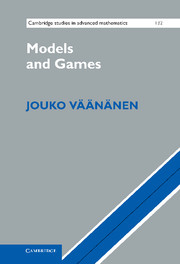8 - Model Theory of Infinitary Logic
Published online by Cambridge University Press: 01 June 2011
Summary
Introduction
The model theory of Lω1ω is dominated by the Model Existence Theorem. It more or less takes the role of the Compactness Theorem which can be rightfully called the cornerstone of model theory of first-order logic. The Model Existence Theorem is used to prove the Craig Interpolation Theorem and the important undefinability of the concept of well-order. When we move to the stronger logics Lk+ω, k > ω, the Model Existence Theorem in general fails. However, we use a union of chains argument to prove the undefinability of well-order. In the final section we introduce game quantifiers. Here we cross the line to logics in which well-order is definable. Game quantifiers permit an approximation process which leads to the Covering Theorem, a kind of Interpolation Theorem.
Löwenheim–Skolem Theorem forL∞ω
In Section 6.4 we saw that if a first-order sentence is true in a model it is true in “almost” every countable approximation of that model. We now extend this to L∞ω but of course with some modification because L∞ω has consistent sentences without any countable models. We show that if a sentence φ of L∞ω is true in a structure M, a countable “approximation” of φ is true in a countable “approximation” of M, and even more, there are this kind of approximations of φ and M in a sense “everywhere”. To make this statement precise we employ the Cub Game introduced in Definition 6.10.
- Type
- Chapter
- Information
- Models and Games , pp. 176 - 227Publisher: Cambridge University PressPrint publication year: 2011



